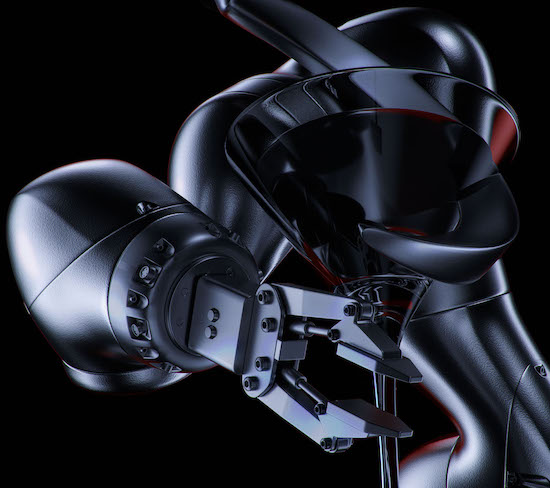You can say many things about those on the socialist left but accusing them of not dreaming big wouldn’t be one of them. From Rudolf Rocker’s anarcho-syndicalist communes, to Charles Fourier’s phalanxes of free love, to the Posadists’ ufology and the workers’ bomb, there’s a deep strain of utopianism etched within the history of thought on the fringes of the left.
None of the ideas in Aaron Bastani’s new book quite reach the absurd levels of Fourier’s oceans of the future being made of lemonade, but with a title like Fully Automated Luxury Communism he’s certainly setting himself up for the accusation. But if taken as it’s intended – as a striking provocation – it’s easy to see that it fits very neatly within the mission statement of the new generation of leftist commentators that have sprung up in recent years: to shake people out of their cosily conformist ways of thinking about socio-political ideas. In any case, one senses that Bastani rather likes drawing the ire of his detractors; regularly engaging in Twitter jousts and attracting controversy for his views on issues such as Poppy Day, Labour’s ongoing anti-Semitism row, and perceived BBC bias.
It was out of the 2011 student protests that Bastani, along with his friends James Butler, Michael Walker and Ash “I’m literally a communist, you idiot” Sarkar, began to launch what has been termed their ‘guerrilla campaign’ against Britain’s mainstream media with an alternative news platform, Novara Media. Following the unexpected surge of Jeremy Corbyn and his strong 2017 election campaign, Novara’s exposure and prominence continued to grow, with Bastani and co ever more frequently storming the citadel of traditional political news media.
Off the back of Novara’s success, comes Bastani’s first book, an entertaining – if flawed – romp through some of the most profound innovations and developments that could, if managed under the aegis of socialism, transform the way in which we live our lives. Among other topics, Bastani explores how free solar power generation could radically undercut the apocalyptic prophecies of global climate change, gene sequencing, synthetic meat, asteroid mining, and why the little-known London Manure Crisis of 1894 could provide a clue as to the likely trend in technological adaptation.

Your book deals with what you call the “Third Disruption”, in which information is becoming ever-more abundant, and it’s the capitalist system that creates artificial scarcity through the price mechanism. How can the riches created by this Third Disruption be unlocked from behind corporate structures? Surely this requires a global effort as a way of avoiding capital flight from any one country that tries…
The Third Disruption is the cornerstone of the book and how you could situate a contemporary socialist project, which would necessarily have to be internationalist. You’re right, there’s a tension between that project and the extant norms and imperatives of neoliberalism which allows friction-less transfer of capital very easily.
Of course, since 1983 and Francois Mitterrand, capital flight has been the great fear of social democracy in one country. That’s probably the major problem you have to overcome in the 21st century. That said, I think it can be overstated. Grace Blakeley has talked about certain taxes that could be levied at the level of the nation-state to inhibit capital flight, i.e. a form of ‘Tobin tax’ (a tax of financial transactions above a certain amount).
More broadly though, a lot of asset wealth in this country is bricks and mortar, and it’s very easy to overstate the extent to which these things are mobile. People can’t move their factories, it’s hard to move human capital – the 30,000 engineers at BAE Systems for example – it’s hard to move the intellectual structure of world-class universities, etc. It’s not something we should be blasé about, but we can be fixated on it.
Let’s say income tax went up several percent, would loads of businesses leave London? I don’t think so. The elite like their London lifestyle, the cosmopolitan values. The thing that worries them more than incremental increases in income tax (because they price that in), is the infringement of private property. Fundamentally, that is what will scare the money interests more.
In the book you use Moore’s Law as the logical bedrock for scarcity becoming less and less a reality, and explore post-scarcity in labour resources, energy, minerals (i.e., space exploration and off-world asteroid mining). What would you say to those who would dismiss this as utopianism?
It is utopian, but that’s not to say it’s implausible. There’s been a great deal of utopian thinking that’s gone into propping up the global financial system since 2008. 0% interest rates for ten years is utopian. In that chapter, I talk about why we need a non-private property framework so that it’s not finders-keepers when it comes to these resources. Things like energy and labour are far more relevant. We’ve already seen zero margin cost in music and films, effectively moving to conditions of post-scarcity in their distribution. The question is, where else do we see that applying in the market in the next few years?
One I talk about is how would healthcare become an information technology? I give an explanation of genetics as information. That is not an epistemological claim, we can literally record music as DNA, we can encode information as DNA and then put it back into zeros-and-ones. The claim is, as these gene editing and sequencing technologies improve, healthcare becomes an information good.
One example is CRISPR-Cas9. It’s like a copy-edit-paste with DNA. Thousands of conditions are the result of a single nucleotide being screwed up – Huntingdon’s, sickle-cell anaemia, Parkinson’s. I believe we could eradicate these conditions – being conservative – in ten years with the right intellectual property framework and the right R&D funding.
Something I’d never come across until reading the book was the London Manure Crisis of 1894, which you cite as a precedent for our modern age. Can you expand on that?
The point was there were tens of thousands of horses drawing stuff across London, the world’s biggest city at the time. People, goods and services were all transported by horses. Horse excrement was everywhere and people were postulating quite reasonably – given that there had never really been cities larger than a million people – that maybe there was a hard limit on society.
We’re having these conversations now with agriculture: we’re over the bio-capacity of the Earth, we are using 1.6 Earths. What the manure crisis shows you is that sometimes the features of an old system come up against the features and possibilities of a new system. The reason I think it’s relevant is that we’re seeing similar things in relation to, for instance, renewable energy.
What’s interesting is that ‘peak horse’ in the United States was the early-1920s, when the car had already been around for a while. Technological transitions tend to take a bit longer than we think; PV cells, lithium-ion batteries, the microprocessor, transistor, etc., these have all been around for 50-60 years. The claim in the book is that in the next fifty years we’ll see a lot more changes than we’ve seen up to now.
You write in the book that “the shift to renewables is coming”. How does this square with the reality of concurrent record energy use in both renewables and non-renewables? For example, 2018 was the record year in terms of global energy demand.
It’s important to say that there are hard limits because we live on a finite planet, but those limits are contingent. The horse manure crisis was overcome by a technological fix – the car. People talk about technological fixes not saving the planet, but what do they think the agricultural revolution was? It was a technological fix.
The point is, I very much doubt the hard limits of today are the hard limits in reality. What would be the hard limit for data storage? A single gram of human DNA takes a mad amount of data. With energy, we get enough solar power in ninety minutes to meet our present needs for a year. Every single organism you’ve ever seen, these are all solar-powered chemical reactions, that’s a lot of energy. So the idea that there’s a hard limit and we have to dig stuff out of the ground to use for energy is ridiculous. As the book says, the major problem is that this is happening, but from the perspective of climate change it’s not happening quickly enough.
I’d like to explore the rather striking book title. Is the term ‘communism’ too loaded in the general public’s mind to be capable or worthy of rehabilitation, and do you worry that it might prove too alienating for your ideas to make an impact?
Paul Mason’s PostCapitalism was very much in the same field, but we didn’t call capitalism ‘post-feudalism’, so clearly you need another term. The mode of production I talk about is just as different from capitalism as capitalism was to feudalism so I would submit it needs a new name.
Why communism? One of the reasons is that I believe the technological trends and the critique of what’s happening with the price mechanism, the classical laws of economics, etc., Marx touched on that. He said that what comes after it – we escape scarcity and the realm of necessity for the realm of freedom – that’s communism. If you were a historian of economic theory, that’s what you would call it.
Secondly, on the term being loaded. That would mean you couldn’t write a book about the Catholic Church because of the Spanish Inquisition, or the Anabaptists because of what the British Empire did and their religion was Church of England.
But you’re not writing a book proposing a great new way to run society based on Catholicism…
The book says this doesn’t look like the communist projects of the twentieth century and goes on to explain why. For example, the work from Marx it’s drawing on wasn’t even available in English. The Grundrisse and ‘Fragment on Machines’ weren’t even available in English until 1973. So when people look at twentieth-century Marxist-Leninist tradition, it’s easy to denigrate people and their morality, but there’s a bigger structural issue. The Soviet Union tried to repress certain heterodox understandings of what Marx was saying.
Furthermore, I’m quite interested in this idea that communism and fascism are the same thing. They’re clearly not. Stalin killed primarily nationals of the USSR, Hitler killed primarily non-German nationals or people he viewed as non-German. The gulags were building infrastructure, Stalin would say that they were killing these people to build a new form of civilisation, whereas when the Germans were putting people into Dachau, it was just about killing them.
But why would you want to reprieve all of that? We have to remember that in Yugoslavia, Italy, France, the democratic tradition against fascism was an anti-fascist tradition, a partisan tradition, and also part of a communist tradition. It’s very strange that communist tradition, that saved democracy in half the continent, has been completely forgotten about.
I do think that the word belongs in there because of the linearity with economic theory and Marx, and secondly, I think it’s important to say that awful things happened in Stalin’s Russia, but anyone on the left today has to confront the problems of the twentieth century and not evade them. It’s like saying neoclassical economics has failed; it’s more complex than just because of the theories of Adam Smith.
You write that “communism is luxurious, it’s an excess beyond the necessary”. Isn’t there a problem here about who it is that defines ‘the necessary’? There will always be those who want more than others…
There’s some intellectual ballast to that point. Thorstein Veblen talked about ‘conspicuous consumption’ – the elite can demonstrate how powerful they are by buying things they don’t really need. We have a pretty well-established ranking of what’s needed for humans – the hierarchy of needs. Necessity boils down to what I talk about being Universal Basic Services – means to subsist, means to be stimulated, means to become the kind of person you want to be. Yes, to an extent those things are subjective, but they are also housing, education, transport, healthcare, etc.
It’s a debate in Marxism as well – is a Van Gogh painting luxurious? It’s fair to say that most of the goods and services in circulation for the very wealthiest people are not necessary because quite patently the mass of society do perfectly fine without them.
I’d like to explore ‘fully automated’ next. JG Ballard said “I would sum up my fear about the future in one word: boredom”. With that in mind, can the existential problems of angst, misogyny, male suicide, depression be blamed in part on declining status, through a lack of purposeful work and the proliferation of ‘bullshit jobs’? Won’t this only become more severe if work is gradually abolished?
First of all, you can be depressed and not bored. I generally believe history is cyclical rather than linear, I don’t believe there’s one trajectory to history. We’re now living in a moment that is very similar to the 1920s, it’s a very ‘non-boring’ time.
I agree, the interiority of the modern human is very much neglected by the left. We don’t really know what causes depression. I have a suspicion that in thirty years people will say Twitter was worse for you than smoking, because of what it does to the neurotransmitters. We don’t know what young boys’ easy access to hardcore porn does to the sex drive, to impulse control, etc.
I do believe that generally speaking, people’s happiness is not independent of the kind of society you live in. Aristotle would talk about Eudaimonia flourishing. The flourishing of the individual is intimately connected to the kind of society you live in. Clinical psychologists say that if you have order, if you’re making new friends and experiences, you’re in an enriching environment – you can still be depressed, but it’s quite easy to mitigate it. In terms of health and mental health and ‘fully automated luxury communism’, a shorter working week is one great way. Another is giving people things to do. It’s very much about reviving civic life – free football facilities, local swimming pools, etc.
The big ideas that this book explores, as well as those of other leftist writers like Ash Sarkar, Owen Jones, and Grace Blakeley, are surely down to the resurgence of the left in Britain and elsewhere in the west. But do you worry that the long-term credibility of these ideas is contingent on Labour not fucking things up?
The ideas could be wrong. What’s happening in the US is there are lots of studies of people under thirty-five identifying as socialists, as well as registered Democrats. It’s there in cultural values around same-sex marriage, but also there in quite concrete things like the belief that capitalism isn’t working.
The only failure that I can see as being mind-blowing is failure inside government. The idea that a Corbyn government goes the way of Syriza – adopting ‘managed reforms’. I don’t think failure would make the ideas any less credible, it’s perfectly possible that a certain generation of leftists might attach themselves to that project, like people did around Blair. But that’s less to do with the core ideas and more to do with poor political judgements. And since Iraq, I find it hard to believe people wouldn’t have learnt the lesson of fidelity to a project.
Trump has smashed the Republican establishment, and the question is whether they will recover. I don’t think they will just go back to normal. And I don’t think that will happen here either, if Boris becomes leader [this interview was conducted before the results of the Conservative leadership contest] that means that the Conservative party has been remade in Nigel Farage’s image. Since Thatcherism and Reaganism, both Republicans and Conservatives were hybrids of quite bigoted, insular, small-town conservatism combined with free market capitalism. If the Tories ‘become’ the Brexit Party, in the same way that Trump has pushed the Republicans into economic nationalism, that’s a once-in-a-century event.
Where do you see Novara Media now within the media landscape and what are your ambitions for it?
We want to be the biggest and most successful socialist millennial media outlet in the Anglophone world. That’s our plan for the next five years. In terms of where we see ourselves in the media, the debate for a long time with the internet was to do with Eric Raymond’s ‘the cathedral and the bazaar’. The cathedral is like the Encyclopaedia Britannica, being replaced by the bazaar – the flat, horizontal Wikipedia. I don’t think that’s true. One paradigm is replacing another but with the rise of networked societies, different paradigms sit alongside each other, they’re inflecting norms and genres in real time. A good example is Twitter – Trump tweets something, the tweet becomes a news story, people are writing about it in comment pieces, etc.
We’re very much new media, but we understand those real-time interactions between media, how can we maximise a socialist agenda and mind-set given that, so we’ve pivoted strongly towards video especially on social media. We think we’re well-placed to succeed.
Fully Automated Luxury Communism by Aaron Bastani is out now, published by Verso Books



